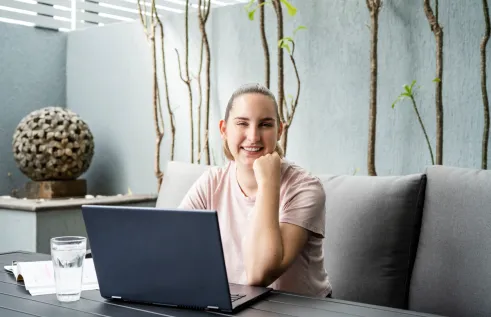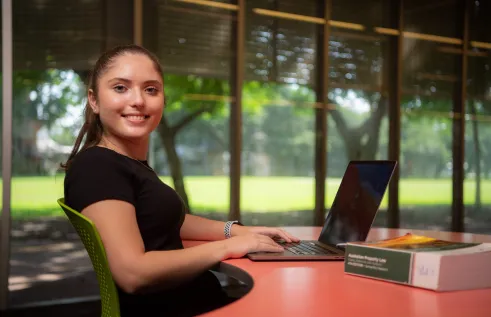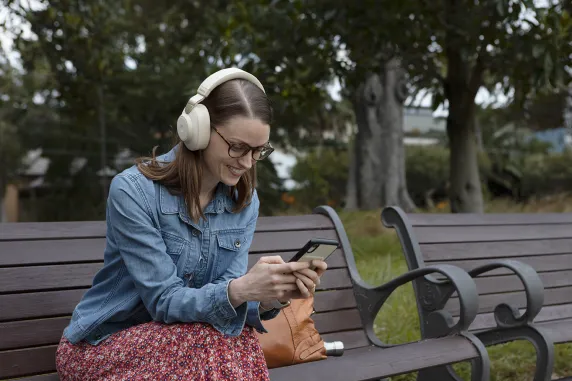Future study
Year 12 survival tips: Optimise your study space

We put so much time and energy into studying during Year 12, so let’s get the most out of it! Maximise your productivity by adjusting how and where you get it all done.
Follow these tips on how to create the ultimate study space to set yourself up for academic success in high school and beyond.
Pick your place
It’s important to choose a study space that’s separate from where you do everything else – eating, socialising and relaxing.
Your study space should be for studying only. Your brain will come to associate that space with learning, so you’ll be in the right frame of mind when it’s time to hit the books. No watching Netflix in your study space, and no studying in your bed!
Here are some top tips for creating a great study spot:
- Tidy your space and remove any clutter, as many studies have shown mess can impact your ability to learn.
- If your study space is at home, add a low-maintenance houseplant to make your space more peaceful (and some plants even improve indoor air quality).
- Remove distractions like your phone and TV, and counteract background noise or loud friends and family members with noise-cancelling headphones.
Tunes to choose
Feel like you need music to study? We get it. Music can lift your mood and boost your motivation to get things done, but songs with lyrics tend to be more distracting than helpful when it comes to studying.
Whether it’s to drown out background noise or you just love listening to music, there are several ways to stay on task without getting rid of tunes completely.
- Try listening to songs in a language you don’t understand so you won’t be distracted by the lyrics (you may even be inspired to learn it!).
- Choose relaxing, classical playlists that are shown to boost your brain’s ability to absorb, interpret and memorise new information.
- Try listening to ambient noise, which has been shown to lead to improved concentration and creative thinking.
Lightbulb moment
Did you know the lighting in your study space can impact your productivity?
Natural light is always best, and it’s free! Try to position your desk near a window to put less strain on your eyes. The more tired your eyes are, the less time you’ll be studying effectively.
What about night owls? If there’s no natural light available, make sure you’re not looking directly into whatever light source you have.
Let’s say your subject requires a lot of textbook readings. It’s best to place a lamp behind you, with the light streaming over your shoulder and illuminating the book.
Get ergonomic
Nobody likes a sore neck, and it’s hard to concentrate when you’re sitting awkwardly. Not only will an ergonomic study space benefit your body, it will make you a more productive learner.
Try these quick fixes for an ergonomic study space:
- Make sure the top of your screen is at or below eye level.
- Keep an arm’s length between your face and the screen.
- Adjust the height of your chair so your thighs are parallel to the floor and your feet are resting flat.
Use your phone as a reward
We all scroll through our phones when we’re bored or procrastinating.
Turn your phone off or switch to aeroplane mode to remove the temptation to check messages and social media. It's hard, we know!
You could even grant yourself five minutes of scrolling time at the end of each hour of productive studying.
Don’t forget to leave
No matter how ergonomic and naturally lit your study space is, you need to give your mind and body a break from studying. This can be as simple as going for a quick walk to refill your water bottle.
Although it might not seem like it, taking a break for five minutes every hour is more beneficial to your studying than going flat-out for two hours straight. Taking a small break helps your mind to refocus and re-energise.
Now that you've got the ultimate study space, good luck on your exams!
Stuck on what to do after Year 12? At CDU, you can choose from mor than 300 university degrees and VET qualifications, as well as a free Tertiary Enabling Program.
Related Articles

What kind of student support can I get at CDU?
Starting university is an exciting time as you immerse yourself in new surroundings, meet new people and take on study challenges. However, it’s normal to feel anxious. How will you adapt to university? Will you make friends? How will you cover all your fees? Let's take a look at all the ways CDU can support you on your journey.
Read more about What kind of student support can I get at CDU?
High achiever Eugenia didn't hesitate to stay local for uni
After receiving an impressive ATAR score, Darwin school leaver Eugenia was going to be spoiled for choice when it came to choosing courses and universities. She didn’t hesitate to stay local and is now kick-starting her accounting career goals at CDU.
Read more about High achiever Eugenia didn't hesitate to stay local for uni
A parent's simple guide to university admissions
As a parent you play an important role in helping your child to make decisions about the educational path they’ll take and helping them understand the admissions process. But first you need to understand it yourself. The process has likely changed since you were a school leaver, so let's break down how it works these days.
Read more about A parent's simple guide to university admissions


